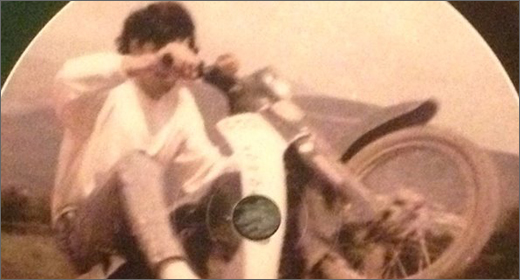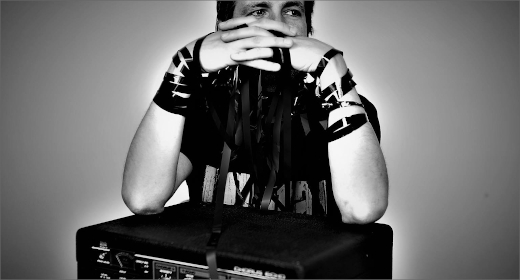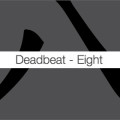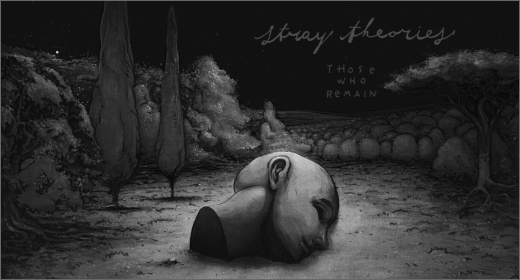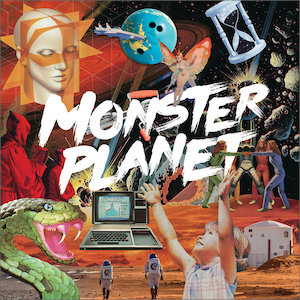::..:::…..:..::….:::::..:::..:::::::……:::…::.:::….::::..:..:::…::…….:::::
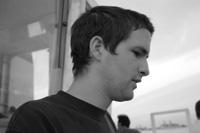
TJ Norris/Igloo :: Hello Scott – it’s a good opportunity to get the chance to say hey, I saw you perform at last year’s Mutek and Sonar Festivals and it became a real intro to your sound. I know you have been touring and traveling quite a bit. Has the last year been a wild ride or what?
Deadbeat (Scott Monteith) :: It’s been a big change for sure. I left Applied Acoustics, the software company I’d been working at for the last 5 years, back in September and have been doing a fair bit of touring and generally concentrating on music. It was a pretty difficult transition initially but I’ve pretty much sorted out the day to day pacing at this point. The touring has been inspiring, draining, amazing … generally just fuckin’ nuts! I know people tend to have pretty polarized opinions about it but at this point I’m still on the fence. There are things about it that I love obviously but the introvert, “allstar house wife” part of my brain sometimes doesn’t take it too well. Let’s make a date to have this conversation again in a couple of years, I’m sure my opinion will have been swayed one way or the other by then.
Igloo :: OK, done deal – but that is, of course dependent on what side of the fence I am on, ah, the creative life! Now on to “Deadbeat”. OK, so what’s in a name?
SM :: Some pretty silly stories and a punch line to a friend’s stupid joke seeming to make about as much sense as any other name after the fact. He was a crazy hardcore drum’n’bass fan who said the music I was making was completely boring, too slow, etc and generally only appropriate for parties filled with dead people. Hence…
Igloo :: LOL! I appreciate a good satirical reason for making a name for yourself.
You have adopted the grand city of Montreal, home to the Mutek Festival, as your home. I think you may be from somewhere in the US Midwest, is that right? Tell me how, why and any particulars you want to share around this residence.
SM :: I’m actually from a small town in Ontario called Kitchener, but I’ve been in Montreal now for almost 9 years, which is longer than I’ve ever lived anywhere else so I’d definitely say it’s the place I call home at this point. The lovely thing about this city is it has all the benefits of a major metropolis and the heart of a small town. This is something that seems to drive some people nuts who have lived here all their lives but I find it pretty comforting. Obviously having Marc right downstairs and generally being surrounded by so many crazily talented and motivated people keeps the creative fires burning.
It’s been very exciting to see international interest develop for Canadian music. I think a lot of the credit probably has to go to the Mutek festival, certainly in terms of Montreal artists. They really put this city on the map. I think it’s a little premature to talk about a really definitive Montreal sound, although I think we’re beginning to hear it. Marc has obviously had a huge influence on the production techniques of a lot of people here, and quite a few in other places in the world I’d say. I think you can still hear echoes of Detroit and Berlin in a lot of the music that comes out of Montreal as well. Give it a few more years to develop and then maybe we can talk about a legitimate Montreal sound.
Igloo :: Wait a sec – who’s Marc? And by the way, major nods to Mutek, I am only sorry I missed the first 3 years – and will be seeing you in a few months for sure – it’s a real honest electronic music community – a village – an sound oasis – a lab!
SM :: Sorry for not being clear. The Marc that I speak of is one Marc Leclair, aka Akufen, aka deranged French Canadian radio wave highjacker, chef and DJ extrordinaire, loving father, and dear friend.
Igloo :: CHEF! Wow – I should look him up when I am in town in June! I’m a food freak, albeit a near vegan.
Let’s talk dub. Your sound has a warm, earthy overtone, and others out there, say Tennis, Pole, Meat Beat Manifesto, Tol, Warmdesk and others are using similar styles and formats to reference dub and/or reggae in their work. What is the attraction/connection to that sound? What “is” that sound?
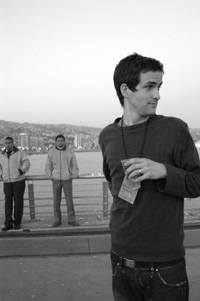
SM :: I came to know dub music in a reverse chronological order. I was first introduced to dub techno (BC, Maurizio, Bluetrain, etc) at raves in Toronto in the early 90s, and have since then gone on to discover the seemingly bottomless treasure trove of classic roots, reggae, and dub proper. It’s amazing when you consider the sheer amount of music that was turned out in a relatively short time from one small island! I also think it’s great that with the mainstream interest in dancehall that surfaced in the last while, that a lot of the great Jamaican producers are getting the attention and respect they deserve.
Recently it occurred to me that one of the reasons, at least on a subconscious level, that roots reggae resonated so strongly with me is it’s melodic similarities to Christian hymns. My father is a United Church minister and as a result my earliest experiences with live music were in church. Beyond this I feel that some music and some people are just built for one another. It would be incredibly interesting to see scientific evidence for this type of connection surface at some point… the results might be a little dangerous though!
While I’ve been known to turn out the odd techno track I’d say the majority of what I do these days falls pretty snugly into the dub category. Because this so obviously stems from and is heavily influenced by black musical traditions, I often struggle with the issue of cultural appropriation, which seems to be disregarded in an electronic music context a lot of the time. I guess regardless of how you categorize the end result, it’s important for me to acknowledge that the rhythms and techniques I use are a lot older than I am, and if I can find some way to place my own voice within that historical framework and maybe push the existing boundaries a little bit then that’s great. I guess I just hope people will enjoy the music regardless of what they decide to call it.
Igloo :: Great point there and very candid way to look at the cultural piece of it indeed.
You have recorded with a few progressive independent (and some of my favorite) labels including Force Inc, Intr_version and now ~scape. With a few releases on ~scape is this now your resident label or do you feel free to roam about with your new ideas to various imprints? Of course, the rules in independent music making are not at all the same as the majors, but does there come a time when your sound and a label mirror each other so well that bonds are formed? What is this process like, and could you explain the difference in working with various record labels, especially if they are abroad. What is the communication process like and how are the relationships built and maintained between artist and production company?
SM :: Generally speaking I think email and the telephone remove a lot of the day to day differences between working with a label that’s around the corner and working with one across the pond. Relationships with a label develop in exactly the same way as relationships with individual people. You face the same kinds of challenges and awkwardness in getting to know one another initially, and when a real connection gets made and you realize that this is a person (or group of people as the case may be) that makes you laugh, supports you, and you generally see eye to eye with, you build on that. Barbara and Stefan have been incredibly supportive and amazing to work with from the get go, as have Mike at Cynosure and Jeff at Revolver. Without their support I definitely wouldn’t be where I’m at today –at the very least we probably wouldn’t be having this little chat anyway.
Igloo :: I don’t know – I pretty much scour the sound scene as finely as possible – I may have found you – but the support network is certainly part of the process and when it’s in full effect results happen – so hats off to those who promote, produce and otherwise have a heart in the whole process of communicating the message of the music! How would you describe the word minimal when applied to your music?
SM :: I think it’s gotten less minimal over time, but it still definitely applies. I guess from my perspective where it may have been initially applicable due to the very few sounds I was using in a given track, now it has more to do with where the movement is happening. The focused aspects in the foreground act as an anchor or steady point of reference for all the nonsense happening out in the periphery. Someone told me once at a cafe when my CD was playing that they thought it was Kruder and Dorfmeister, which I thought was funny. If what I’m doing ends up being at least as inoffensive as those guys to a casual listener in a cafe but still provides an engaging soundtrack for the guy listening to it on headphones walking around the park, then I’m happy. If people feel inclined to get their groove on to it in the clubs then all the better!
Igloo :: You recently were married, and I hear rumours that this became the basis for your latest recording Something Borrowed, Something Blue (~scape). Can you talk about this a bit and how your personal experience directly impacts your sound?
SM :: For a long time music has provided an outlet for me to deal with things on an emotional level I don’t have time for in my day to day life. A sort of therapy if you’ll pardon the cliche. I was so overjoyed about getting married and at the same time stressed about everything that had to be planned for the reception, etc that I really didn’t have time to worry about the things that were bothering me. So as a result, while it has its brighter moments, the new album is pretty dark overall ironically. I guess it sort of allowed me to purge myself of those concerns.
Igloo :: Can you touch on technology a bit. How important is your working structure? Do you imagine a chasm between the tweaking and switching between programs and channels and the outcome, the final product to have any level of counter-productivity to the process? Do you ever find the outlying construct of working with a laptop, sequencers, filters and other equipment and devices to be a bit cumbersome or in the way of the creative process? Or is the portability and flexibility of sounds just right? Do you incorporate acoustic instruments ever? What is the value in using keyboards, skinned percussion, strings and things in the 21st Century?
SM :: The computer is the instrument I’ve chosen at this point and while the near infinite realm of possibilities it offers up never ceases to amaze me, it’s become a very comfortable noise making interface for me. I took piano lessons for some years when I was small but I never really had the focus for it. I never actually read any of the music, I’d always just wait for my teacher to play a piece through and then I’d try to reproduce it by ear and remembering where his fingers went. In retrospect I wish I’d been more committed to this as I can’t read a piece of music to save my life now. When I was about 15 friends of mine had started a band and they needed a bass player. I didn’t really have the money to buy a bass and an amp, but they all pitched in and got one for me. I’ll always be thankful to them for that. A little later on another friend showed me the music he was making on his Amiga using a software called ProTracker. This got me really excited. That one person could make so much noise with just a computer was a completely amazing epiphany.
When I think about how far the technology has come in such a short time it really it blows my mind. Designing individual sounds and textures is what I enjoy doing the most at this point. If I could develop a program that just allowed me to concentrate on this and then did the arrangement for me I think I’d be very happy. (Deadbeat-Process.exe perhaps ? : ) I can’t see myself picking up the bass again anytime soon, but I’m definitely open to the possibility of collaborations with other musicians. I think this kind of interaction is something we’re going to see more and more in the years to come, where the person with the laptop is just another part of the band as a whole, playing her/his instrument.
On a grander scale, I think we are reaching a point where much of the structural possibilities in music have been covered, if you look at it strictly by the numbers. The last real revolutionary “format” to surface in my mind was probably drum’n’bass. This is something that never could have come about without the aid of computers and samplers due to the sheer complexity and speed of the rhythms. It’s very interesting to see drummers now learning to physically play those rhythms. It’s a wonderfully modern headfuck, the machine teaching the person.
Igloo :: And then there are folks like Joseph Suchy whose guitar and Tom Heasly whose tuba basically transfigure the natural forces of their acoustic instruments to weave in and out of electronic music as if it was always meant to be – basically the reverse of what you are saying. I find this to be a very intriguing time when it comes to music.
Now, can we talk shop for a moment? What type of equipment and software do you use when recording and does it differ when you perform live? Any trade secrets?
SM :: All of my music is made entirely inside the computer, save for the samples of everything from voices to bathtubs that get recorded into it. I’m a big fan of modular environments like Applied Acoustics’ Tassman and Native Instruments Reaktor. The freedom that these environments offer up is really astounding. Having the ability to construct my own instruments and FX really adds another level of excitement to the process for me. The only downside to this is it can sometimes be difficult to decide whether you’re going to spend your day building a new instrument or actually working on music! As far as actually putting things together I use Ableton Live exclusively at this point, as well as for live performance. Robert, Gerhard, and the whole team at Ableton have really put together what I believe is the most well thought out, ergonomic piece of music software there is. It may not appeal to everyone’s working methods, but for me it’s as close to perfect as anything out there at this point.
I think the synthesis and sound design capabilities of the computer have really reached, and in some cases surpassed, the possibilities offered up by hardware, both in terms of raw power and quality. As an example I recently picked up a new EQ plug-in by a company called Sonalksis from the UK called the SV-517. Generally speaking EQ and compression are tasks that those who can afford it will still rely on hardware for, due to a certain magical sparkle that the analog equipment introduces to the signal. Many plug-in manufacturers have claimed to capture this over the last few years, but to my ears this is more often then not just marketing hype. With this EQ however there is a desirable, distinctive character added to the sound that has blown me away. It’s at this point that I think we can really say that software has surpassed hardware, and I think it’s about time the hardware companies started focusing their efforts and use their previous know how on developing new controllers, instead trying to compete with the software companies on a DSP level. I recently heard that Korg will be releasing software emulations of some of there classic synths. Does the world really need another emulation of a classic analog synth? I think not. Would I like to see Korg develop a powerful MIDI control surface based on their existing technology? Absolutely!
Igloo :: Phew! I feel totally wired now (sorry!). There is talk of you traveling again soon, through Europe. Are there some favorite places you have played live? Do you feel a connection to the audience – do you feel the walls they may have once been visible between audience and technology are starting to erode. I am thinking of the differences between pop/rock crowds and those who come out to see Deadbeat perform. I know when I go to see say, Stereolab or even a DJ show like Kid606 – there is a different energy than when I have been at a Matmos or Pan Sonic show. Is this something in my head, just my imagination? What can you say about this atmosphere and does it change culturally when performing in foreign places?
SM :: Things have gotten a little weird regarding performance issues in the last few years. While on one hand it’s probably fair to say that most people have learned to accept laptop shows, there is definitely a camp within the electronic music audience that got really sick of watching skinny bald guys noodling away on their trackpads at some point, and started propagating a very strong anti-laptop sentiment. I think this is one of the reasons why the whole electroclash thing got so big as it was so strongly performance driven, some would say (myself included) at the expense of the music. I think similar comments could be made about the sort of shoegazer / IDM (GOD I HATE THAT FUCKING ACRONYM!!!) stuff that’s surfaced in the last couple of years as well, as it’s starting to involve guitars and vocals back into the mix –something which we can probably largely blame on Christian Fennesz. :)
I think after the peak of the whole minimal explosion that happened (I’m thinking around 1999 – 2000, Pole 2, Oval, Force Tracks and the whole minimal house thing, etc), people began to realize that somewhere along the way the music had gotten really heady; too process driven and obsessed with “newness” both in terms of the sound and the technology that was being used to create it. As a result I think people were really craving dynamic performances and good old fashioned party music, so they looked to the past for that electro, house, disco etc. I definitely felt that in Germany this time around. A lot of the clubs have really gone back to the old rave aesthetic of big dumb pounding four-to-the-floor techno. Don’t me wrong I went to raves for years and I still like to go out and get a good techno bludgeoning every so often.
Overall, these days I think it’s more important than ever to go out and support the bands/acts/DJs that you’re into. Speaking as a audience member, if I have the opportunity to see someone I like on a nice loud system I’m definitely gonna be there, and at the end of the day I don’t really give a shit what they do on stage…
Igloo :: When not playing live or recording – what do you do behind the scenes? What are you reading or listening to? Favorite or influential artists?
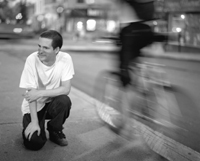
SM :: I just finished Neal Stephenson’s Cryptonomicon, which is a ridiculous funny, incredibly thought provoking 1000 page brick. While I was on tour I also finally got a chance to read “Foucault’s Pendulum” by Umberto Eco, which I also loved. Generally speaking, I’m a big geek and a total sucker for anything regarding conspiracy theories, well researched techno-thrillers, and a die hard Tolkien fanatic when it comes to books.
On the music tip, it’s always all over the place. I picked up a lot of new classic roots 7″s at Hardwax in Berlin while I was there. Bohren and Der Club of Gore just released a new album that I think is as damn near perfect as anything ever done with real instruments. Deru is the man, as is Sixtoo from right here at home. The new Skoltz Kolgen that’s coming out on Mutek_rec is the most exciting thing I’ve heard in the realm of microsound for a long time. AGF’s latest on Musork will take your breathe away –I could go on for days !!!!
Igloo :: I loved AGF’s record on Quecksilber…in fact they are playing here in Portland tomorrow night (with Sue Costabile doing visuals!).
Speaking of great live performers –can you talk a bit about your working relationship with Robert Henke (Monolake)?
SM :: I think Robert and I share a common respect for well thought out interfaces which maximize the advantages that computers provide, as well as a common loathing for the graphical emulation of hardware for aesthetics sake. Vintage synths and effects provided so little control compared to what is possible on the computer, so why would you ever want to recreate those deficiencies? I think the Atlantic Waves interface is really a testament to that, as it offers so much control from a single page. He really did a spectacular job on it. We were able to create a 45-minute performance that was interesting for us, and I hope for the audience as well, using only 10 sounds! The next version of the software is going to be one bad ass live machine with a lot more options, and we’re really looking forward to turning it out at various shows in the coming months.
Igloo :: What are you working on right now? Can we expect other recordings and or special projects in the near future?
SM :: Steve (aka Stephen Beaupre, my partner in crime as Crackhaus) and I have been focusing on a new Crackhaus CD for the last few months, which will feature about 7 or 8 new tracks from us as well as some killer remixes from some of our nearest and dearest here in town. This should hit the streets just in time for Mutek all faring well.
As far as my own stuff is concerned, For the next while I’m still going to be concentrating on the live end of things, which I like to tweak the format of and reconfigure from show to show, otherwise it can get a little tedious. After Mutek though, the summer is going to be all about new material, which should surface sometime in the fall.
Igloo :: I’ll be watching for that Crackhaus disc. Well, it’s great to get to chat you up, I will extend my hand next time I see you live. Final word?
SM :: Thanks for listening.
::..:::…..:..::….:::::..:::..:::::::……:::…::.:::….::::..:..:::…::…….:::::
Something Borrowed, Something Blue is out now on ~scape.
Deadbeat is participating in this year’s Mutek Festival at Workshop #3 (Friday, June 4th):
::..:::…..:..::….:::::..:::..:::::::……:::…::.:::….::::..:..:::…::…….:::::










